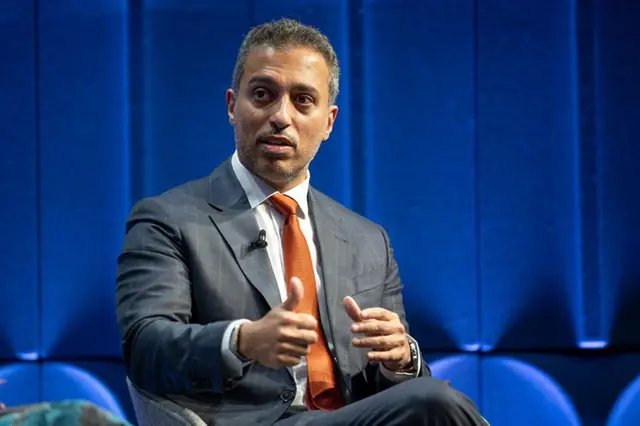His Excellency Dr. Ahmad Belhoul Al Falasi, Minister of Education, participated in the ‘Education Meets AI’ session at the Annual Meeting of The World Economic Forum WEF, held until January 19 at Davos, Switzerland. He highlighted the role of technology in advancing educational systems and improving its outcomes.
In attendance were Bettina Stark-Watzinger, Germany’s Federal Minister of Education and Research; Hadi Partovi, founder and CEO of the education nonprofit Code.org; and Jeffrey R. Tarr, CEO of Skillsoft. The session was moderated by South African anchor Nzinga Qunta.
During the session, participants discussed the opportunities and challenges of using AI in education. They also explored the most prominent practices required to empower both students and teachers while enhancing the overall outcomes of the educational system to meet the requirements of the labor market and contribute to providing students with advanced sciences and knowledge.
His Excellency Dr. Al Falasi said that technological progress stands as the foremost catalyst for human progress, unlocking new horizons for development across sectors. He emphasised that such progress enables countries and governments to equip individuals with qualifications and empower societies to build a better future. He also highlighted that nations capable of effectively and safely embracing these advancements will be better positioned to harvest their benefits in the future, fostering comprehensive and sustainable development across various sectors.
His Excellency Dr. Al Falasi stated that “in recent years and decades, we have observed numerous groundbreaking innovations that have profoundly transformed the operational dynamics of various sectors, challenging established traditional concepts that were once considered indisputable.” His Excellency highlighted that education has not been immune to these transformative developments. Indeed, multiple previous discussions often questioned the use of calculators, computers or the internet in education. He highlighted that experience has demonstrated the importance of a meticulous approach, involving in-depth study and evaluation of modern technologies. The key is to ensure that their advantages are harnessed in a manner that positively impacts all facets of the educational process, making it more efficient and of higher quality.
Al Falasi also questioned concerns about technological advancements replacing teachers, emphasising that technology is a supportive, complementary tool rather than a substitute. He reiterated the indispensable role of teachers in shaping students’ awareness and skills and the need for more qualified educators to impart future sciences, noting that technological innovations can bridge this gap and enhance teachers’ capabilities for more efficient task performance.
Dr. Al Falasi also highlighted the UAE’s pioneering initiatives in leveraging AI, notably through the introduction of the UAE National Strategy for Artificial Intelligence 2031. This strategy is linked to attaining the objectives of the UAE Centennial 2071. Additionally, the UAE stands as the global trailblazer in establishing a dedicated ministry for artificial intelligence, underscoring the government’s proactive stance in keeping abreast of technological advancements and capitalising on the opportunities they offer.
Al Falasi outlined the UAE Ministry of Education’s strategy for AI integration, focusing on transparent and reliable platforms. These platforms are designed per the cultural and social privacy considerations of Emirati society. He further highlighted that the Ministry actively analyses feedback from the experimental implementation of AI in education. The goal is to continually enhance the experience, ensuring that it contributes to improving education quality, fosters a culture of innovation, and nurtures generations equipped with the skills and knowledge essential for the future.
The World Economic Forum, held under the theme ‘Rebuilding Trust’, aims to re-establish the foundational principles of consistency, transparency and accountability among global leaders. Every year, the Forum convenes more than 3,000 leaders from the public and private sectors, representatives of major international companies, non-profit organisations, academics and specialists from all over the world. The aim is to discuss all political, economic and development issues impacting the world.

